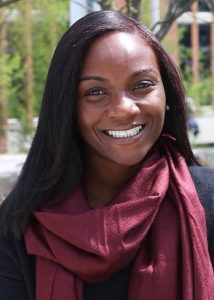
Kizzmekia S. Corbett
*On this date in 1986, Kizzmekia Shanta Corbett was born. She is a Black viral immunologist.
Kizzmekia "Kizzy" Shanta Corbett was born to Rhonda Brooks in Hurdle Mills, North Carolina. She grew up in Hillsborough, a rural town in North Carolina, where she had a large family of stepsiblings and foster siblings. Corbett attended A.L. Stanback Middle School and graduated from Orange High School in Hillsborough, North Carolina, in 2004.
2008, Corbett received a B.S. in biological sciences and sociology from the University of Maryland, Baltimore County (UMBC). 2014 Corbett received a Ph.D. in microbiology and immunology from the University of North Carolina at Chapel Hill. While in high school, Corbett decided to pursue a scientific career. As part of a program called Project SEED, she spent her summer holiday working in research laboratories, one of which was at UNC’s Kenan Labs with organic chemist James Morkin. In 2005, she was a summer intern at SUNY StonyBrook in Gloria Viboud's lab, studying Yersinia pseudotuberculosis pathogenesis.
From 2006 to 2007, she worked as a lab tech in Susan Dorsey's lab at the University of Maryland School of Nursing. From 2006 to 2009, Corbett was a biological sciences trainer at the National Institutes of Health (NIH), where she worked alongside Dr. Barney Graham. At the NIH, Corbett worked on the pathogenesis of respiratory syncytial virus pathogenesis and on a project focused on advancing innovative vaccine platforms. From 2009 to 2014, Corbett studied human antibody responses to the dengue virus in Sri Lankan children at the University of North Carolina at Chapel Hill. She studied how people produce antibodies in response to dengue fever and how the genetics of dengue fever impact the severity of a disease.
From April to May 2014, as part of her dissertation research, Corbett was a visiting scholar at Genetech Research Institute in Colombo, Sri Lanka. 2014, Corbett became a research fellow, working as a viral immunologist at the NIH. Her research aims to uncover mechanisms of viral pathogenesis and host immunity. She specifically focuses on the development of novel vaccines for coronaviridae. Her early research considered the development of Severe Acute Respiratory Syndrome (SARS) and Middle East Respiratory Syndrome (MERS) vaccine antigens. During this time, she identified a simple way to stabilize spike proteins in a conformation that renders them more immunogenic and manufacturable in collaboration with researchers at Scripps Research Institute and Dartmouth College.
At the onset of the 2019–20 coronavirus pandemic, Corbett started working on a vaccine to protect people from coronavirus disease. Recognizing that the virus was similar to severe acute respiratory syndrome coronavirus, Corbett's team utilized previous knowledge of optimal coronavirus S proteins to tackle the novel coronavirus. S proteins form a “crown” on the surface of coronaviruses and are crucial for the engagement of host cell receptors and the initiation of membrane fusion in coronavirus disease. This makes them a particularly vulnerable target for coronavirus prophylactics and therapeutics. Based on her previous research, Corbett's team, collaborating with investigators at UT Austin, transplanted stabilizing mutations from SARS-CoV S protein into SARS-CoV-2 spike protein. She was part of the NIH team that helped solve the cryogenic electron microscopy (CryoEM) structure of the SARS-CoV-2 spike protein. Her prior research suggested that messenger RNA (mRNA) encoding S protein could be used to excite the immune response to produce protective antibodies against coronavirus disease 2019.
Corbett's work allowed her to join the National Institutes of Health team that welcomed Donald Trump to the Dale and Betty Bumpers Vaccine Research Center in March 2020. Corbett has called for the public to be cautious and respectful of one another during the coronavirus pandemic, explaining that regular hand washing and sneezing into one's elbow can help minimize the virus's spread. She has also emphasized that SARS-CoV-2 is not a "Chinese virus" but a global virus that could have started anywhere. When asked about her involvement with developing the COVID-19 vaccine, Corbett said, "To be living in this moment where I have the opportunity to work on something that has imminent global importance…it’s just a surreal moment for me".